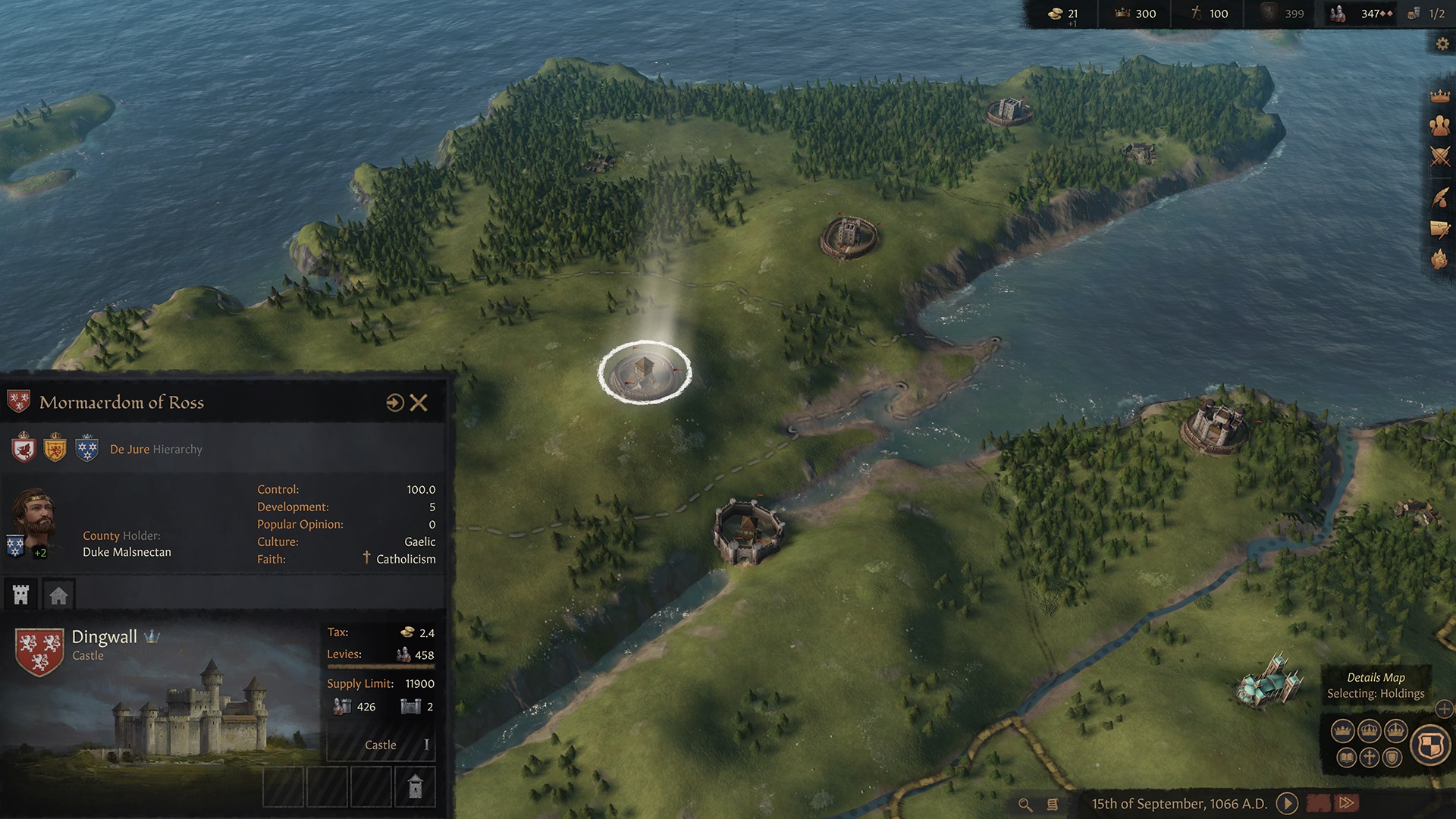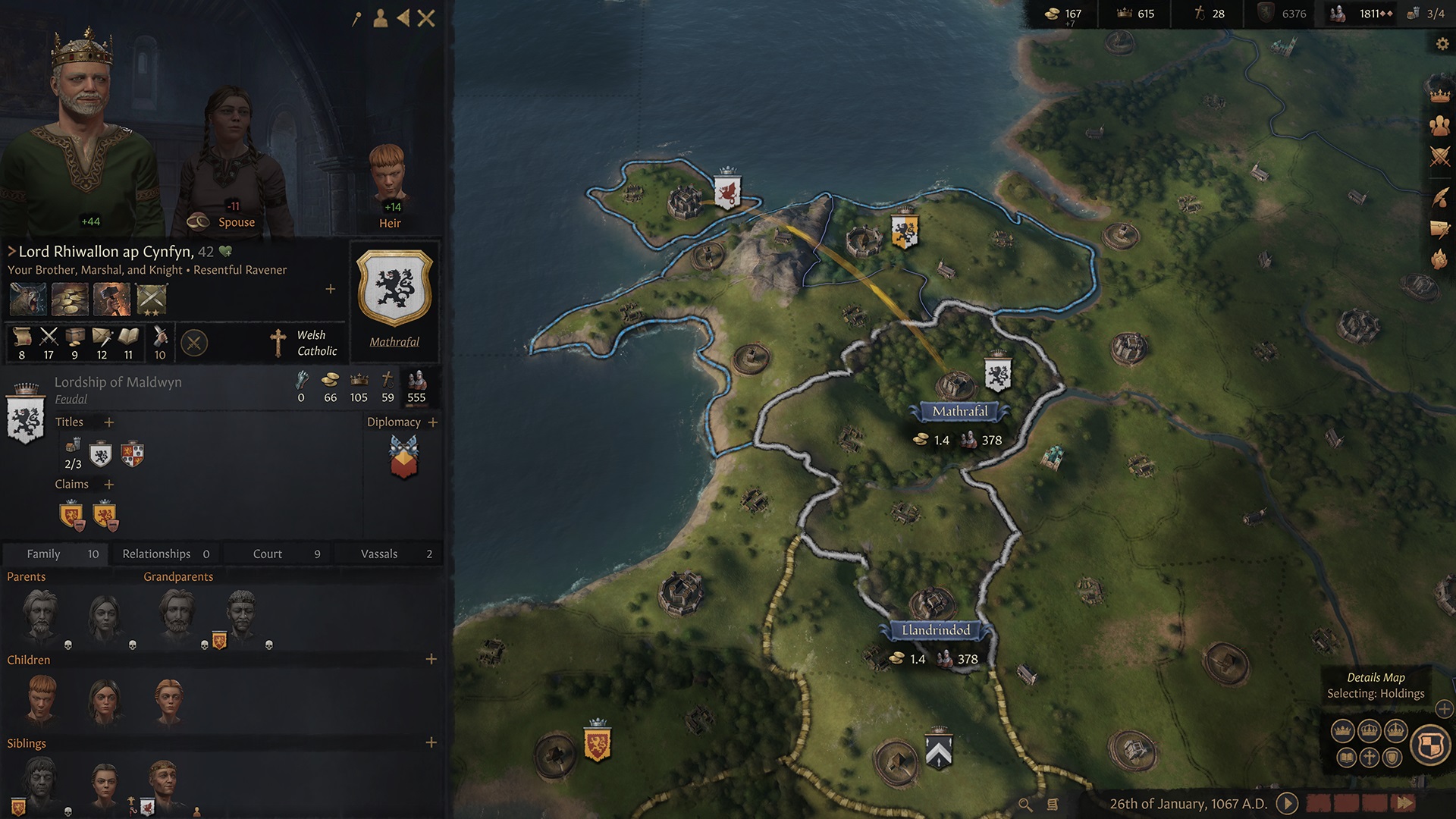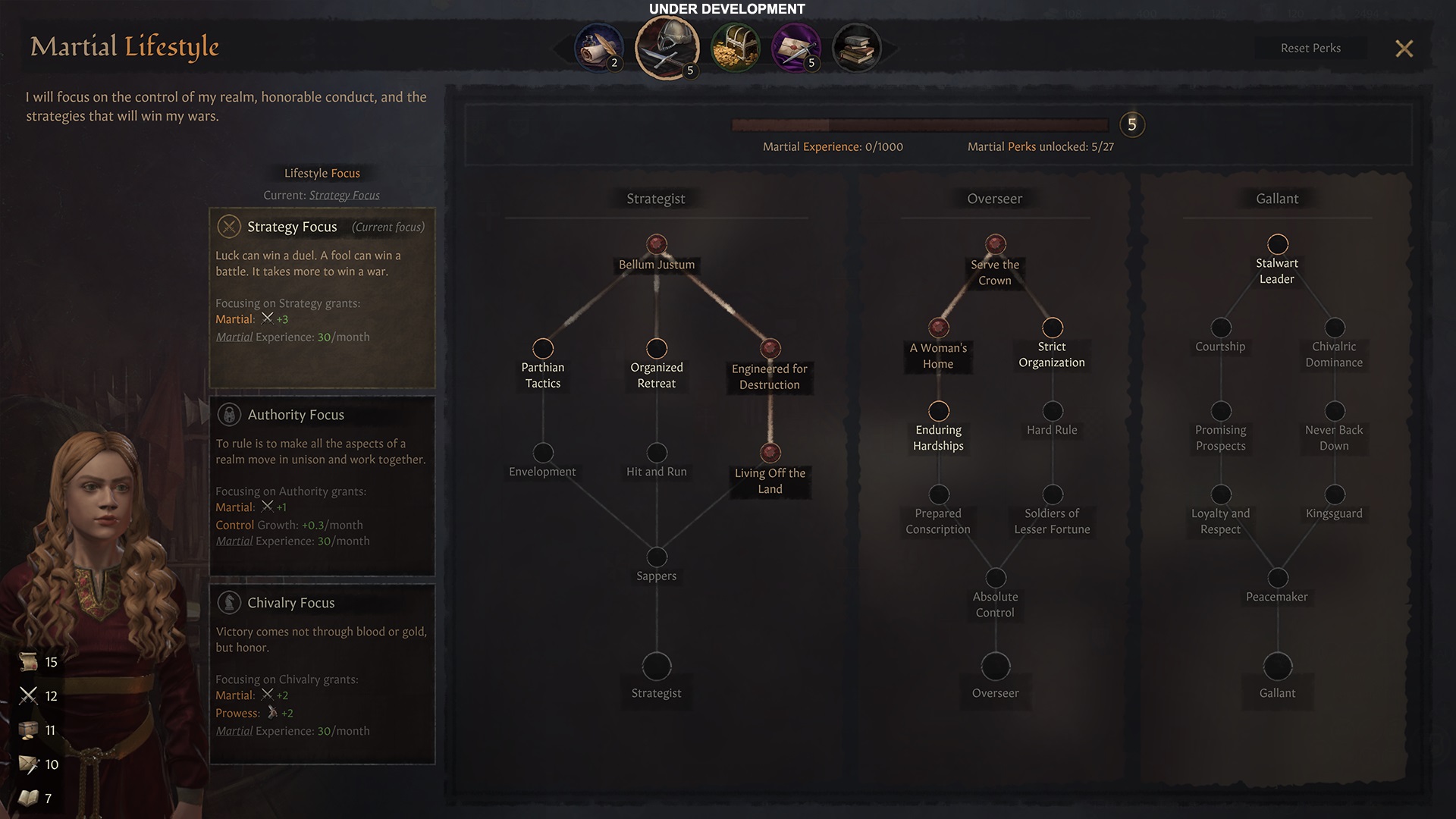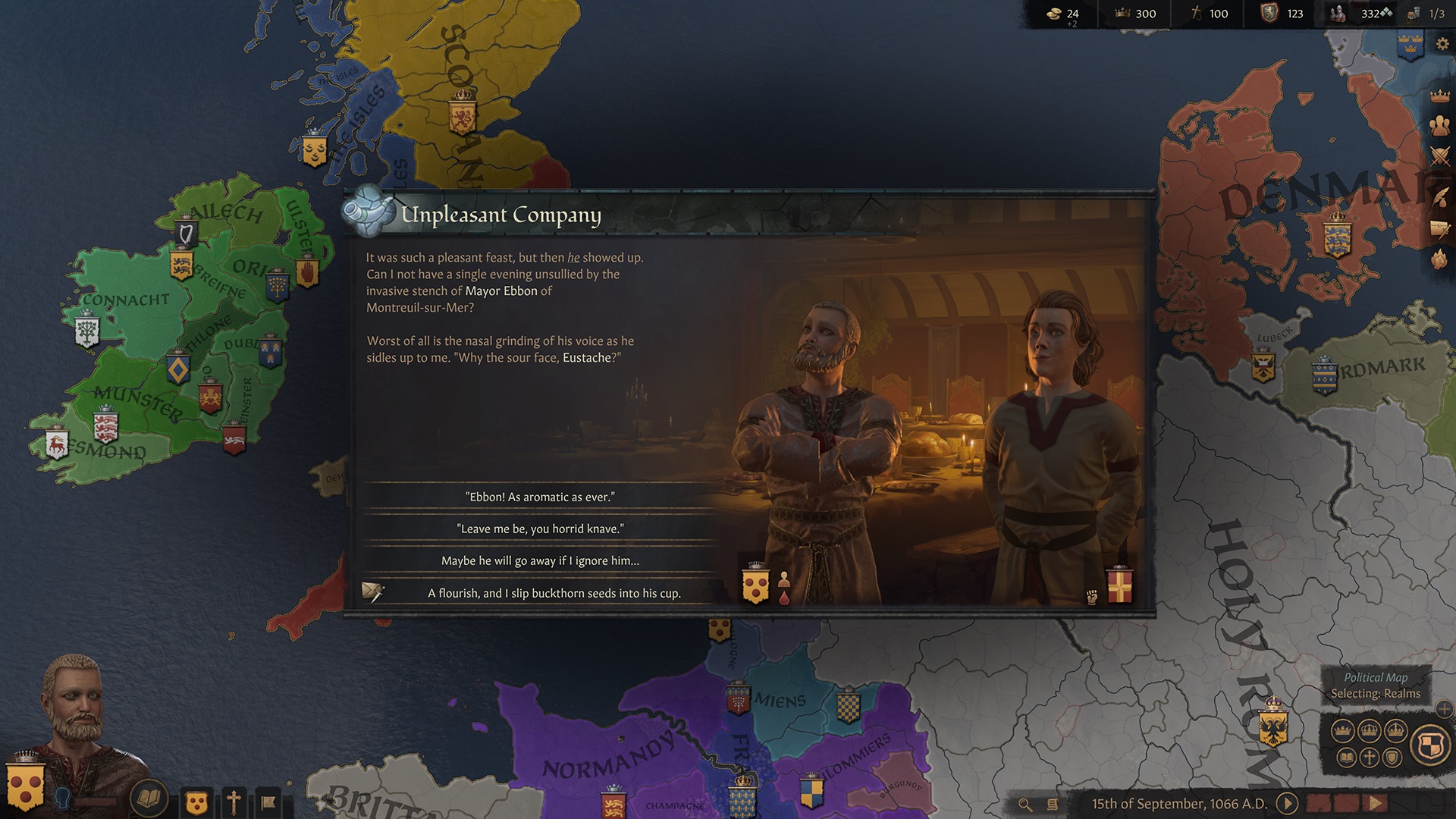Crusader Kings 3 will let you become the pope of your own cannibal cult
Our first look at Paradox's grand strategy sequel.

With Crusader Kings 3, Paradox is diving into what made its predecessor such a unique grand strategy game—the roleplaying, the focus on character-driven factions instead of abstract nations—with a renewed focus. After eight years of DLC, Crusader Kings 2 is gargantuan, but it's also a bit bloated, so this fresh start is a chance for Paradox to develop and experiment with its most popular features.
It's hard to remember what CK2 was like all the way back at launch, but it was definitely smaller. Crusader Kings 3 promises to start out beefier, with no unplayable factions and a map that covers the same area CK2 does now, but physically much larger, with locations that were previously hidden away in menus now appearing on the map itself.
The map is a handsome one, too, rendered more lovingly and realistically, but what's really important are the people living inside it. They're mostly still trapped inside menus, though at least now they're 3D models accompanied by poses to reflect mood and personality. These often extremely flawed humans and their dynasties drive Crusader Kings 3, and as a leader of a dynasty—which you will almost always be, whether you're a count or an empress—you'll now have more control over how it develops.
Dynasties can essentially level up, at which point new bonuses in a broad range of categories can be assigned, benefiting every member in the dynasty. Legacies almost seem like specialisations, so if you want your family to be a bunch of conquerors, you can start progressing down the warfare track. But of course there's a wrinkle. You won't necessarily want everyone in your dynasty to benefit, but you'll have no choice... unless you decide to take the dramatic step of kicking the black sheep out of the dynasty entirely, which might not go down well among the rest of your family. You can't go exiling everyone you don't like.
Rather than one group that marches together in lockstep, dynasties contain cadet branches—houses—that have their own heraldry and some autonomy. Instead of CK2's model, where dynasties are these big monolithic groups, landed members of your dynasty can try to carve out a bit more agency for themselves and their family by forming a new house.
By spending some of the Renown resource, the heads of houses can legitimise bastards and take other actions to strengthen their position, and while you won't be seeing any dynastic civil wars, the head of a house can rise to become the head of a dynasty if they become powerful enough. The system promises more dynamism with less micro-management, with the goal being to spread your dynasty far and wide, even if everything isn't directly under your banner.

Building your dynasty sometimes means adding dynasty-wide bonuses. At other times it means combining the traits of parents to create better heirs. You can also tend to the spiritual needs of your people, creating your own religion or offshoot. Your religion won't immediately be adopted by your dynasty, however, so you'll need to encourage people to join.
The biggest gaming news, reviews and hardware deals
Keep up to date with the most important stories and the best deals, as picked by the PC Gamer team.
Religions are made up of various rules and traditions that you select when you're conjuring it up. What are the vices of your faith? What does it say about divorce? Who is allowed to be a priest? Does it have any qualms about cannibalism? While the list seems dense, some of the choices appear to be largely flavour, but it also gives you excuses to start holy wars and get new ways to influence those who have decided to join your hip new people-munching cult.
You'll be able to set yourself up as the head of your new faith, whether you want to call yourself the pope or something else, but starting a faith comes with a cost. You might prefer to save up and throw your lot in with another established religion that's already popular in your neck of the woods, working your way up the ladder there instead.
At least at first. Once you've stored up all that Piety, you can then peace out and form a much cooler gang that has fun orgies.

While you'll have all these broad concerns with your religion, dynasty and the lands that you control, Crusader Kings 3 promises more of a focus on the individual. You'll once again be able to pick a lifestyle for your ruler, but this time it unlocks a trio of perk trees that relate to it. If you pick the martial lifestyle, for instance, you might focus on chivalry, becoming a knightly Gallant, or you can focus more on logistics and strategy. You don't need to just settle for one tree, either.
Despite being such a big part of Crusader Kings 2, roleplaying was largely optional. If your character is a cruel idiot, that might be expressed through events, but you could play that character any way you wanted. In Crusader Kings 3, playing against your personality will have some potentially dramatic side effects, all the way up to your ruler losing their mind.
The traits, then, aren't just intangible stat modifiers, but helpful personality guidelines. It's not unlike a GM rewarding a really good roleplayer with extra experience in a tabletop game.

Crusader Kings 3 doesn't feel like a big departure from its predecessor, and after nearly a decade of managing my unruly families, turning vikings into Holy Land kings and making Scotland a super power, I was perhaps expecting something more overtly different, rather than iterative. But it does feel like Paradox has better identified the parts of the series that are the most engaging and the best at generating completely loopy family dramas, and then unfurled them. It doesn't look any less of a strategy game, but even with this first glimpse it's apparent that it's becoming more of an RPG.
Keep an eye out for the full Crusader Kings 3 preview in the next issue of PC Gamer magazine.

Fraser is the UK online editor and has actually met The Internet in person. With over a decade of experience, he's been around the block a few times, serving as a freelancer, news editor and prolific reviewer. Strategy games have been a 30-year-long obsession, from tiny RTSs to sprawling political sims, and he never turns down the chance to rave about Total War or Crusader Kings. He's also been known to set up shop in the latest MMO and likes to wind down with an endlessly deep, systemic RPG. These days, when he's not editing, he can usually be found writing features that are 1,000 words too long or talking about his dog.

